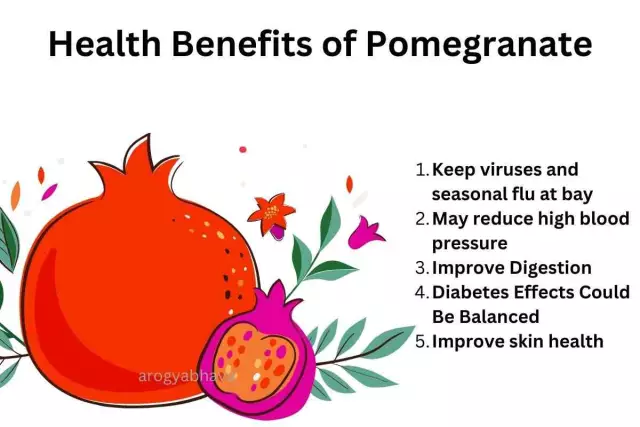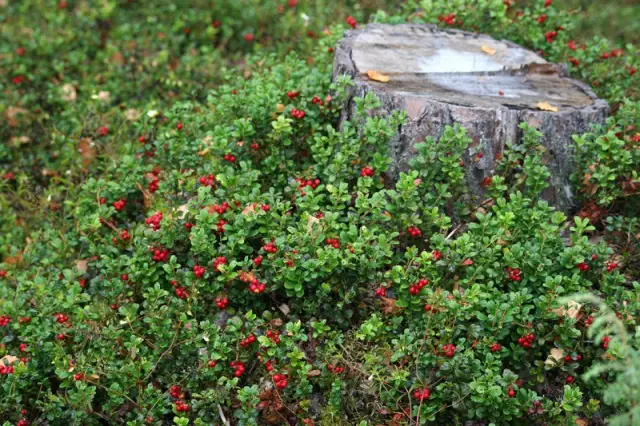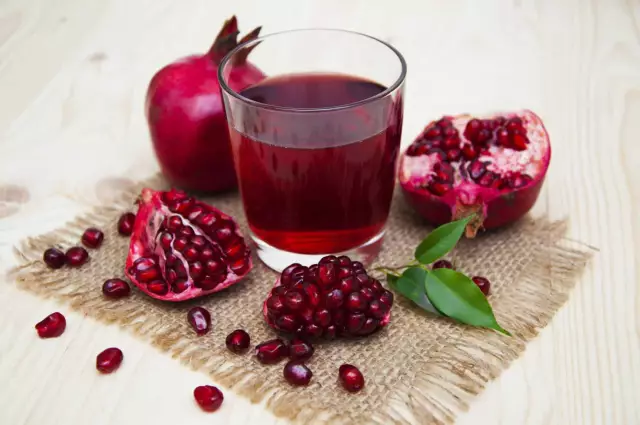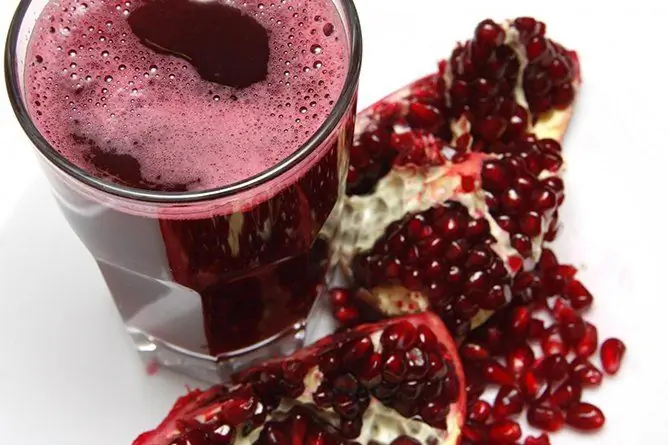- Author Rachel Wainwright wainwright@abchealthonline.com.
- Public 2023-12-15 07:39.
- Last modified 2025-11-02 20:14.
Garnet
Pomegranates are the fruit of the pomegranate tree, which is widespread in the tropics and subtropics. The pomegranate season in Central Asia and the Caucasus usually begins in early October and lasts until the end of November.
The ratio of BJU in the product

Source: depositphotos.com How to burn 83 kcal?
| Walking | 21 minutes |
| Jogging | 9 minutes |
| Swimming | 7 minutes |
| A bike | 12 minutes |
| Aerobics | 17 minutes |
| Household chores | 28 minutes |
Useful properties of pomegranate
Pomegranate fruits keep well at room temperature for a month. When ripe, the fruit should be large, firm and heavy, and the skin should be cracked. You can extend the season of pomegranates by saving them in the form of juice. Pomegranate juice can be stored in the refrigerator throughout the winter, while retaining all its beneficial properties.
The taste of pomegranate is sweet and sour. The sweetness of the fruit is given by monosaccharides - fructose, glucose and sucrose, which usually constitute up to a fifth of the total mass, astringency - tannins contained in the pulp. Various acids, especially citric acid, give the pomegranate a refreshing taste. Also, the fruits contain boric, tartaric, succinic, malic and oxalic acids, vitamins A, C, E, B1, B2 and polyphenols with P-vitamin activity.
One of the most useful properties of pomegranate is its ability to have a beneficial effect on blood and increase hemoglobin. Pomegranate pulp strengthens the walls of blood vessels and prevents the development of atherosclerosis. Also, pomegranate fruits gently reduce blood pressure in hypertension and affect the nervous system.
The fruit and peel of the pomegranate are astringent, so they are used for diarrhea, colitis and enterocolitis. In folk medicine, the peel is also used to treat infectious diarrhea caused by dysentery bacillus and other pathogens. Pomegranate pulp has a beneficial effect on the stomach, improving appetite and promoting good digestion.
Also, the beneficial properties of pomegranate are used to lower blood sugar in diabetes, since it is believed that pomegranate juice is able to replace insulin to some extent.
Organic acids and tannins found in fruits and peels make it possible to use fresh juice or decoctions for the treatment of various ENT diseases - angina, pharyngitis, stomatitis or gingivitis.
It is recommended to drink pomegranate for radiation injuries, for the treatment of malignant tumors, as well as for increasing immunity and normalizing hormonal levels.
Not only pomegranate fruits contain useful substances. So, the peel of the fruit is valued for the antihelminthic properties that are provided by the alkaloids included in the chemical composition - isopeltierin, peltierin and methylisopeltierin. Tea is prepared from the leaves of the pomegranate tree, which has a beneficial effect on gastrointestinal disorders.
Also useful are pomegranate seeds, which contain oils that restore hormonal balance in the body, especially during painful periods and menopause. A decoction of flowers is used in the form of a poultice, which relieve pain in bruises and fractures and, in addition, promote the healing of varicose ulcers and bedsores.

The use of a grenade
To increase hemoglobin, it is recommended to drink half a glass of pomegranate juice several times a day. To achieve a lasting effect, it is best to drink it half an hour before meals for several months daily. Due to the high acid content, it is recommended to dilute pomegranate juice with water.
As a remedy for stress, you can add dried pomegranate membranes to tea. They will not only help you calm down, but also improve your sleep.
Both fresh pomegranate juice and dried peel can be used to treat diarrhea. So, adults are recommended to take a pinch of crushed dried peel after meals, and a glass of juice diluted in half with water will be enough for children.
To prepare an antihelminthic agent, 40-50 g of crushed pomegranate peel is infused in 400 g of cold water for 5-6 hours. Then boil in an enamel bowl over low heat until half of the liquid has evaporated. The resulting broth must be cooled, filtered and drunk in small portions within an hour. After an hour, it is recommended to drink a laxative, and after 5-6 hours - to make an enema.
For various inflammatory diseases of the liver, kidneys and joints, you can drink a decoction of pomegranate bark. To prepare it, 2 teaspoons of crushed bark are boiled in a water bath in one glass of water for half an hour. Then the broth is filtered and brought to the original volume with boiled water. They drink 50 g several times a day before meals.
In cosmetology, pomegranate juice is used to treat acne, as well as to remove freckles and age spots. To whiten your skin, you can use a mask made from a teaspoon of pomegranate juice and sour cream. The mask is applied for 10-15 minutes, after which it is washed off with warm water.
Contraindications
Despite a lot of useful properties, pomegranate has some contraindications. So, pomegranate is contraindicated in case of gastric ulcer and gastritis with high acidity. With these diseases, only well-ripened sweet fruits can be consumed in small quantities. Also, pomegranate is contraindicated for hemorrhoids, cracks in the anus and chronic constipation. With low blood pressure, it is recommended to drink pomegranate juice no more than several times a week.
YouTube video related to the article:
Found a mistake in the text? Select it and press Ctrl + Enter.






